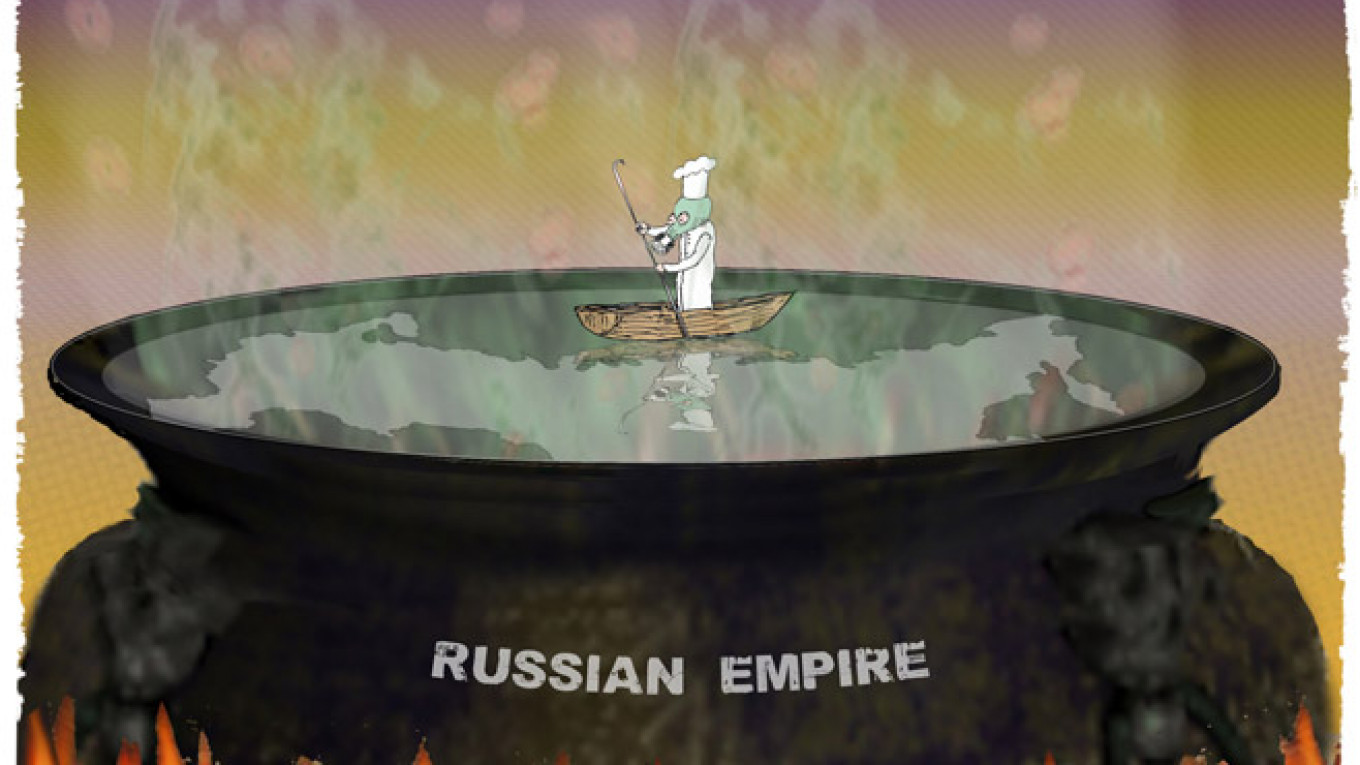Following World War I, the Russian Empire bid farewell to Poland, Finland, the Baltic states and Bessarabia [in modern Moldova]. The Soviet Union later regained only some of that territory — and yet that did not prevent the world from continuing to view the Soviet Union as an empire. After the collapse of the Soviet Union, Russia decreased in size even more than it had after World War I, and yet many today continue referring to it as an empire.
I recently read an impassioned plea on Facebook from several Ukrainians that God call down on Russia a host of biblical chastisements and hasten its demise. In their view, the only way to escape the claws of the Russian bear is to kill the animal. At the same time, they have no intention of fighting the beast themselves, convinced that Europe and the U.S. alone have the power and the responsibility to vanquish the foe.
In other words, they prefer that others break their bones in the bear's den so they can mount the pelt over their fireplace. I somehow doubt that the rational West finds that prospect very attractive.
In fact, a number of historical figures dreamed of dismembering Russia. Peter the Great's arch-rival King Charles XII of Sweden held that dream even before Russia formally declared itself an empire. The French ambassador in Stockholm at that time said, "The king will make peace with Russia only after he has arrived in Moscow, toppled the tsar from his throne, divided the state into small principalities and summoned the boyars to divvy up the kingdom into their personal provinces."
In hindsight, knowing how the Swedes suffered defeat at the Battle of Poltava, it is tempting to assess such a claim as pompous bravado. However, that was a serious plan that the Swedish king and his allies had discussed on more than one occasion. Charles really did plan to install his own puppet ruler on the Russian throne. He dreamed of Pskov, Novgorod and all of northern Russia as Swedish possessions. He planned to allot all of Ukraine and the Smolensk region to Polish King Stanislaw Leszczynski. Charles agreed to give Russia's southern lands to the Turks and Crimean Tatars. There are countless other similar stories in history — but where are all those dreamers today?
However, this is not the main point. I see no reason to blame my ancestors for their imperialist actions. Russians have no more to feel ashamed of in this regard than do the British, Germans, Spaniards and French. All of their imperialist pasts were dictated by fate, God, geopolitical factors and their national character — that with which it is absolutely pointless to fight.
The collapse of the Russian Empire deeply troubled many of its citizens, and the later collapse of the Soviet Union gave them a disturbing sense of deja vu. Even today, millions of Russians wax nostalgic for the past — particularly for the Soviet Union — recalling much that was also good from that time.
This is the second time in a century that Russia has gone through such painful "withdrawal symptoms" while overcoming its imperialist mentality. Russians have nothing of which to feel ashamed: the same process was no less painful for other "imperial" nations.
Of course, modern Russia is not an empire, and it is unbecoming to act like a broken record, continually repeating the same old cliches. It is just that the process of adapting to the new realities is not moving as quickly as some in the West — and also in Russia, by the way — would like it to. But it is impossible to hurry it along.
It is decidedly easier for a tiny little ship of a state such as Monaco to make a sea change than it is for a massive ocean liner such as religiously diverse, multiethnic and multicultural Russia. A little patience is needed.
I understand that what seems fast by historical standards might appear painfully slow to people. History is measured in ages, but individuals measure time in terms of a single lifespan. Nonetheless, it takes nine months for a baby to come into this world, and no amount of impatient fingernail-biting will change that.
Making a baby come into the world any sooner is not the healthiest option either. In the same way, it does no good to keep impatiently tugging on Russia's sleeve. Every fruit has its given period of maturation. When the time comes, Russia will let go of the last vestiges of its imperial past.
Until then, praying for God to curse Russia with a swarm of locusts or the 10 plagues of Egypt is not only unseemly, but also a bit archaic and completely meaningless.
Pyotr Romanov is a journalist and historian.
A Message from The Moscow Times:
Dear readers,
We are facing unprecedented challenges. Russia's Prosecutor General's Office has designated The Moscow Times as an "undesirable" organization, criminalizing our work and putting our staff at risk of prosecution. This follows our earlier unjust labeling as a "foreign agent."
These actions are direct attempts to silence independent journalism in Russia. The authorities claim our work "discredits the decisions of the Russian leadership." We see things differently: we strive to provide accurate, unbiased reporting on Russia.
We, the journalists of The Moscow Times, refuse to be silenced. But to continue our work, we need your help.
Your support, no matter how small, makes a world of difference. If you can, please support us monthly starting from just $2. It's quick to set up, and every contribution makes a significant impact.
By supporting The Moscow Times, you're defending open, independent journalism in the face of repression. Thank you for standing with us.
Remind me later.






